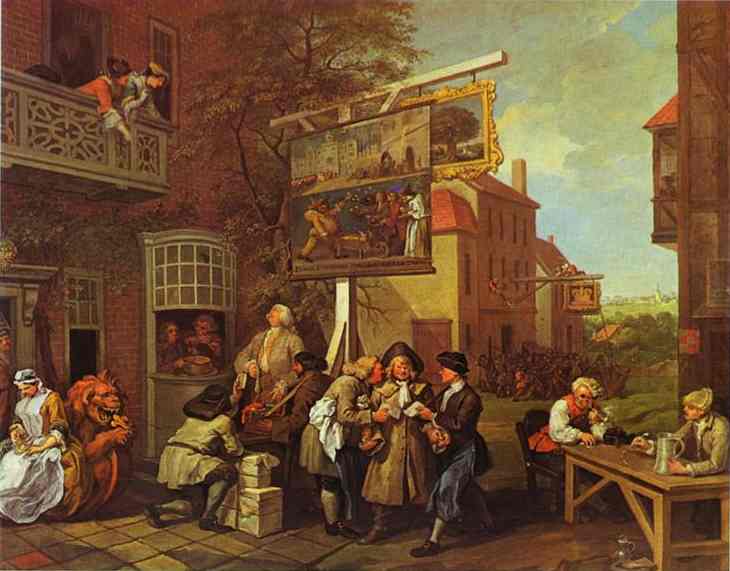
William Hogarth, Canvassing for Votes
One curious aspect of this very loud election season has been that the two largest political rallies were staged by entertainers: Glenn Beck’s “Restoring Honor” rally of August 29 and John Stewart and Stephen Colbert’s “Rally to Restore Sanity and/or Fear” this past Saturday. A rightwing pundit and two liberal comedians (one of them who poses as a rightwing pundit) seem to command more respect than most politicians. One is tempted to say, with Gloucester in King Lear, “Tis the times’ plague, when madmen lead the blind.”
Actually, there are many passages in Shakespeare that could be applied to this year’s election. How about this one from the Act I storm scene in The Tempest:
Hell is empty and all the devils are here.
As I write this post, tiny witches and goblins knock on my door. With Halloween and Shakespeare mingling in my mind, I think of Horatio’s apocalyptic forebodings in Hamlet:
A little ere the mightiest Julius fell,
The graves stood tenantless and the sheeted dead
Did squeak and gibber in the Roman streets:
As stars with trains of fire and dews of blood,
Disasters in the sun; and the moist star
Upon whose influence Neptune’s empire stands
Was sick almost to doomsday with eclipse:
And even the like precurse of fierce events,
As harbingers preceding still the fates
And prologue to the omen coming on,
Have heaven and earth together demonstrated
Unto our climatures and countrymen.—
Does this prediction sound too dire for what is, after all, merely a midterm election? Regular readers of this website know that I am skeptical about disaster warnings, including predictions that a Republican or a Democratic victory presages catastrophe. The times may be “out of joint” (Hamlet again) but we’ll muddle through regardless of the outcome. In fact, all the heated rhetoric and political posturing of the past year means that a passage from Macbeth might be more appropriate:
Life’s but a walking shadow, a poor player
That struts and frets his hour upon the stage
And then is heard no more: it is a tale
Told by an idiot, full of sound and fury,
Signifying nothing.
While it may seem appropriate to compare our current political “idiots” to a man who will grab for power by any means necessary, let’s also keep our heads. Our candidates are pale imitations of Macbeth, and if we’re experiencing more televised sound and fury than normal, it may be because of a recent Supreme Court decision removing restrictions from political spending. A lot of the hoopla signifies nothing.
So I turn to Shakespeare’s fools for another view. There’s a reason why, in crazy times, societies rely on comedians. “Sir Toby will be sworn that I am no fox; but he will not pass his word for two pence that thou art no fool,” Feste tells the censorious and overly earnest Malvolio, providing all of us with a restorative perspective. Yes, we are all fools and need to stop taking ourselves so seriously. As another of Shakespeare’s fools reminds us (Touchstone from As You Like It this time), “The fool doth think he is wise, but the wise man knows himself to be a fool.”
Touchstone’s words apply to our official fools as well. If Beck, Stewart, or Colbert start inflating their importance, then they are genuine fools and not voices of sanity.
Feste, however, knows who he is so I’ll let him start ushering us out of this election season. Twelfth Night concludes with a song in which he describes a world in which everything has been going downhill since childhood and in which “the rain it raineth every day.” So be it, he shrugs. The world may be screwed up but at least it provides great material for our entertainment:
A great while ago the world begun,
With a hey, ho, the wind and the rain,
But that’s all one, our play is done,
And we’ll strive to please you every day.
On second thought, I don’t think I’ll end this post with Feste. Comedy may help us stay balanced but it’s a commentary on politics, not a substitute for politics. As the fool in King Lear knows only too well, even the most accurate comic perceptions don’t do much good if our leaders fail to act on them. In fact, Lear’s fool drops out midway through the play as the world spirals out of control.
Let me therefore invoke the ideals upon which this country was founded. When you go to vote tomorrow, ask yourself who most has the good of your country at heart. Who is in politics for service rather than ego? Vote for the principled and selfless Brutus (or as close as you can get) and vote against those other senators who unsheathe their knives out of envy of Caesar. Just because you characterize your opponent as a tyrant doesn’t automatically mean that you are what’s best for America. Here’s Antony eulogizing Brutus:
This was the noblest Roman of them all;
All the conspirators save only he
Did that they did in envy of great Caesar;
|
He, only, in a general honest thought
And common good to all, made one of them.
His life was gentle, and the elements
So mixed in him that Nature might stand up
And say to all the world, ‘This was a man!’
One Trackback
[…] in which the Republicans “shellacked” the Democrats. In the days leading up to it, I looked at it through the lens of various passages in Shakespeare. I urged voters to follow Samuel […]